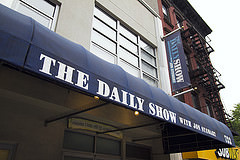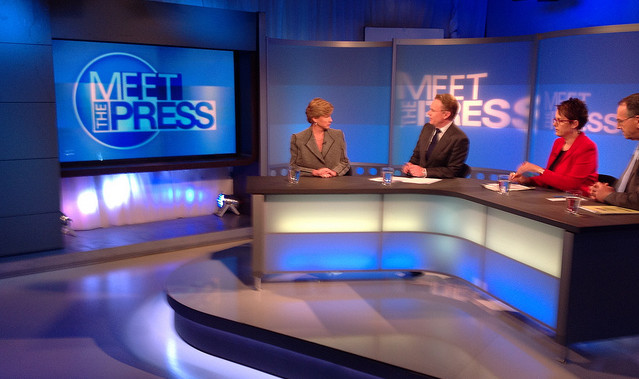After reports surfaced that NBC was seriously courting Jon Stewart, a comedian and the host of The Daily Show, to host the network’s longest running and arguably most prestigious television program, the mere fact that Stewart was considered has huge significance for the future of political news programs. If serious media organizations are considering infusing comedy into hard-hitting journalism, what will be the impact? Can a political program be both as funny as the Daily Show and as informative as Meet the Press? When word of NBC’s courtship of Stewart got out, media analysts rushed to consider the implications of Stewart hosting the longest running and most prestigious show on television. Many were supportive, but there was of course significant criticism.
Once one of the most significant shows on morning television, Meet the Press has lost ground to both its main competitors, ABC’s This Week and CBS’s Face the Nation, which are doing well in the sought-after 25-54 year old demographic. These shows are doing better than Meet The Press possibly because they have modernized and attempted to rebrand themselves by tweaking their formats. Face the Nation, for example, has quickened its pace while attempting to cover a wider range of subjects. But even with revamping these shows, comedic shows like Bill Maher’s Real Time and John Oliver’s Last Week Tonight still perform better, especially with the younger demographic. The vast majority of Sunday morning talk show viewers are still over the age of 54, and the aging audience and the popularity of other shows hosted by comedians has forced media organizations to think outside the box.
An interesting example of the combination of humor and politics is comedian Bill Maher’s show on HBO, Real Time, which is similar to Meet the Press in format but is heavy on laughs. Bill starts off with stand-up, has a one-on-one interview and then goes to a panel of political commentators, much like Meet the Press. In fact, sometimes the guests overlap. Andrea Mitchell, for example, has been on both panels numerous times. But does this kind of political program work the same way Meet the Press does? Reviews are mixed.
Real Time gets plenty of praise. The show has been nominated for the Emmy for Outstanding Variety Series every year since 2004. Larry King, former king of CNN interviews, called Real Time one of the “three best shows on television.” Nevertheless, it is often asserted that political shows led by comedians are far too biased and in no way even-handed. Real Time is no exception. Maher is often criticized for being too liberal and one-sided and it is certainly fair criticism. Maher is not shy about being a liberal Democrat. He proudly flaunted the $1 million donation he gave to President Obama in 2012 on his live show. More recently, the show launched a new segment called “Flip A District” , where Bill asked viewers to vote on a Congressman they’d like to see lose his or her election this November. They chose to oust Minnesota representative John Kline, who Bill is now actively campaigning, fundraising, and donating to unseat.
On the other hand, Maher has received criticism from other liberals who objected to his controversial conversation with Ben Affleck about Islam. Reza Aslan recently called his views on religion “not very sophisticated.” And Aslan is not the only critic of Maher’s controversial and potentially offensive views on religion. This question of bias is consistently asked of comedians like Bill Maher, whereas traditional news anchors like Chuck Todd and George Stephanopoulos are rarely accused of such extreme bias. The kind of people morning shows attract, largely people 55 and over, would probably have trouble trusting hosts who are liberal political advocates and openly partisan.
Still, Bill’s show is important in foreseeing a future for traditional news programs to infuse comedy because Real Time is the closest in format to Sunday morning shows. Yet the comedic format of Stewart, Colbert and now John Oliver seems to be more popular with viewers. Oliver, who is only in the middle of his second season on HBO, is already beating Maher in the ratings with a formula almost identical to Stewart’s: a monologue making fun of D.C. politics and sly advocacy for (mostly liberal) underrepresented causes like climate change and net neutrality, a skit or two and usually an interview. There is no political panel, few political commentators, and few alternate perspectives to Oliver’s. It’s hard to imagine Sunday morning shows working in this format. It’s also unclear whether inserting these comedians into the traditional format, like on Maher’s show, would work either, especially considering that comedians seem to attract more viewers in programs where they are the sole star.
 One of the primary reasons that giving comedians this platform has gained support is their ability to be outsiders. The Atlantic asserted that “the norms of comedy allow its practitioners to treat politicians with irreverence and skepticism that very serious news anchors seldom equal.” It makes sense that comedians outside the Washington beltway are able to poke fun at and criticize politicians without the reserve that serious media anchors might have. It is unclear, however, if this would last if comedians were given more traditional roles with access to more influential Washington power players.
One of the primary reasons that giving comedians this platform has gained support is their ability to be outsiders. The Atlantic asserted that “the norms of comedy allow its practitioners to treat politicians with irreverence and skepticism that very serious news anchors seldom equal.” It makes sense that comedians outside the Washington beltway are able to poke fun at and criticize politicians without the reserve that serious media anchors might have. It is unclear, however, if this would last if comedians were given more traditional roles with access to more influential Washington power players.
However, many media analysts find the idea ridiculous. Mediaite’s Joe Concha opined that there’s no way Meet the Press would have worked with Stewart as a host the way The Daily Show does. He simply could not facilitate the “deep dives into policy,” which is an understandable criticism, given that Stewart’s show is less than half an hour and deep dives into policy aren’t feasible.
For now, at least, it seems as if political comedy and Sunday morning shows will remain in two separate realms. But NBC opened the door to the idea and interested the public in a future for infusing comedy into traditional and serious programs. When the youth is as disaffected with the current government as this one’s, hosts who have no qualms insulting politicians might usher in a new era for young viewership. Still, older viewers would have to accept that their news hosts are totally partisan and primarily liberal, which could force them to tune out and stop viewing altogether, making the gains from youths less significant.
